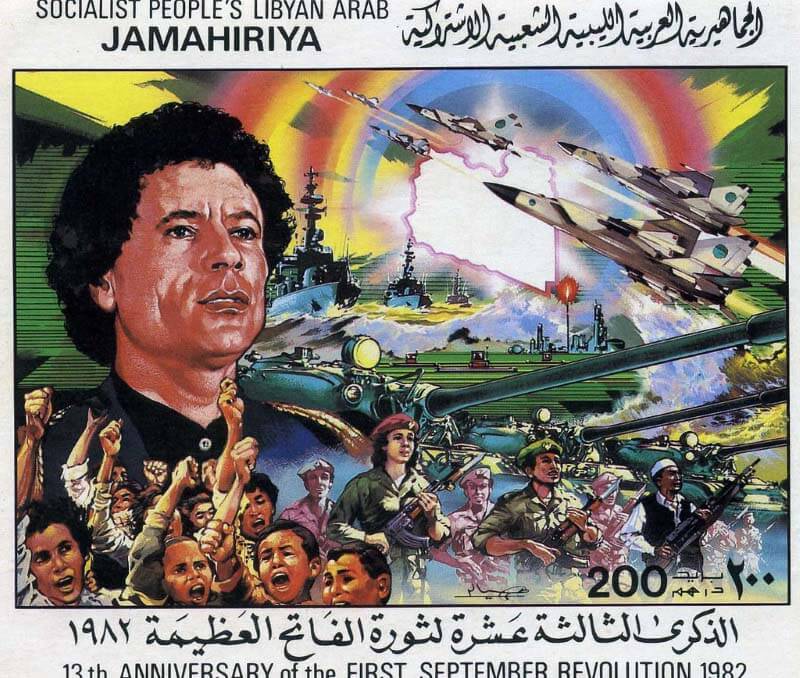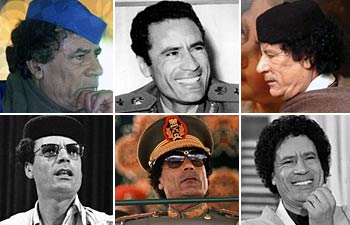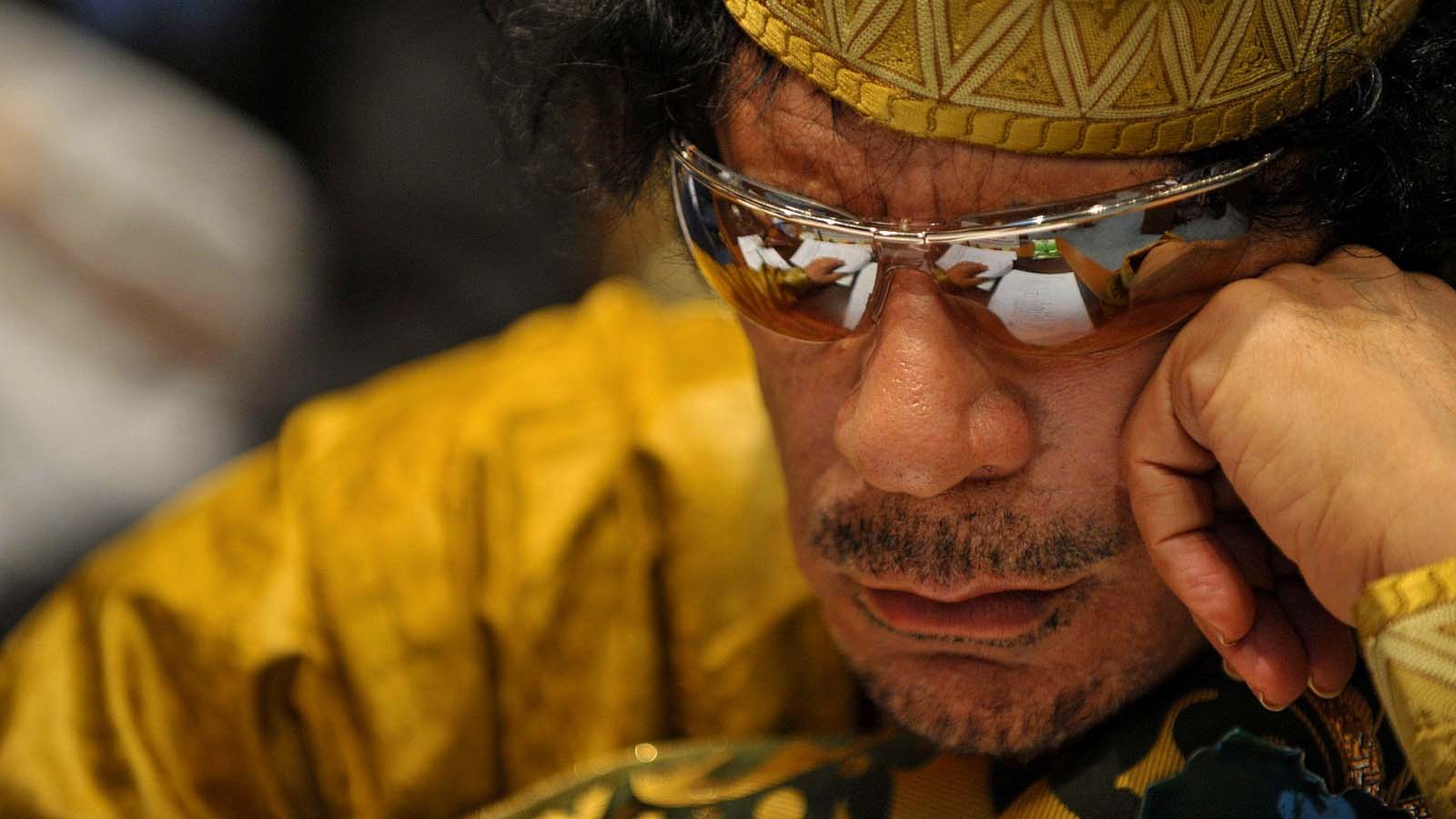Muammar Abu Meniar el-Gaddafi, son of a Bedouin nomad was born into a poor home in the North African desert, south of Sirte, Libya, in 1942. While a student at a secondary school at Sebha, Gaddafi was inspired by the speeches of Egyptian President Gamal Abdel Nasser and became a committed Arab nationalist. Gaddafi organized his fellow students into revolutionary study groups at Sebha. He later joined the Libyan Military Academy in Benghazi, where he found out that many of the cadets were sympathetic to his anti-Western nationalism.
Commissioned into the Libyan army in 1965, he began laying groundwork for an overthrow of the Libyan monarch, King Idris, whom he considered a pawn of the Western European nations. Within four years Gaddafi took control of the army and on September 1, 1969, he seized power in a carefully planned coup. Assuming command of the government as chairman of the ruling Revolutionary Council, Gaddafi declared himself commander-in-chief of Libya’s armed forces and its government, with the rank of colonel.

1982 – 13th Anniveersary of the First September Revolution (1969) Libyan stamp 200. dirham/Flickr – CC BY-SA 2.0
Gaddafi soon began implementing his long-dreamed plans for Libya by nationalizing all foreign banks and oil companies and insisting on closing down all European military bases in Libya
The Great Fall
The end of Muammar Gaddafi 42-year rule was a poignant punctuation to the region’s ongoing revolutions. The consequences of the death of Gaddafi, the Arab world’s longest-serving leader and self-anointed “King of Kings” are not simply as black and white as many observers are likely to conclude.
Here’s why his death may be a major loss to Libya and to Africa in general:
1 • Women Empowerment Vs Declining Women Rights
One group that has suffered immensely from NATO’s bombing campaign is the nation’s women. Women in Gaddafi’s Libya had right to education, hold jobs, divorce, hold property and have an income. The United Nations Human Rights Council praised Gaddafi for his promotion of women’s rights. When the colonel seized power in 1969, few women went to university. Today, more than half of Libya’s university students are women. One of the first laws Gaddafi passed in 1970 was an equal pay for equal work law.
Nowadays, the new “democratic” Libyan regime is clamping down on women’s rights. The new ruling class is tied to traditions that are strongly patriarchal. According to Simon Tisdall, Muammar Gaddafi’s violent death leaves Libya at a crossroad. President Jacob Zuma condemned the death of Gaddafi, he said “Given there was a warrant of arrest against Gaddafi, those who found him should have arrested him and handed him to the ICC, We expected him to be captured, given that everybody knew there was a warrant of arrest issued against him. There is a trend across the world where former leaders accused of injustice are not given an opportunity to stand trial in a court of justice. That is surprising. I think even those who accused him [Gaddafi] would have wanted to see him become answerable.” The South African president lamented.
2 • Libya: Now A Failing Economy
In 1967, Colonel Gaddafi inherited one of the poorest nations in Africa; however, by the time he was assassinated in 2011, Gaddafi had turned Libya into one of Africa’s wealthiest nation. Libya had a high GDP per capita and life expectancy on the continent. Less people lived below the poverty line. After NATO’s intervention, Libya is now a failing state and its economy is in shambles. As the government’s control slips through their fingers and into the militia fighters’ hands, oil production has dwindled.
3 • Deterioration Of One Of The Best Social Infrastructure In Africa
For over 40 years, Gaddafi promoted economic democracy and used the nationalized oil wealth to sustain progressive social welfare programs for all Libyans. Under Gaddafi’s rule, Libyans enjoyed not only subsidized health-care and education, but also subsidized electricity and interest-free loans programs. Now the health-care sector is on the verge of collapse as thousands of Filipino health workers flee the country, institutions of higher education across the East of the country are shut down, and black outs are a common occurrence in once thriving Tripoli. Usually, if Libyans could not find the education or medical facilities they need, the government funded them to go abroad and some get a U.S.$2,300/month for accommodation and car allowance.
4 • Loss Of Peace & the Rise Of Terrorism
The fall of Gaddafi’s administration has created all of the country’s worst-case scenarios: Western embassies have all left, the South of the country has become a haven for terrorists, and the Northern coast a center of migrant trafficking. Egypt, Algeria and Tunisia have all closed their borders with Libya. This all occurs amidst a backdrop of widespread rape, assassinations and torture that complete the picture of a failed state. In agreement with this ugly scenario, In December 2015, one of BBC news Africa’s headline read “lawless Libya: can peace be achieved?“. Mustafa Fetiuri, an award winning Libyan Journalist and independent Libyan academic wrote in an article for Al-Monitor that today, Libya is home to all sorts of fundamentalists and terror groups, be it al-Qaeda in the south or IS in the cities of Sirte and Sabratha. The latter was the target of US air raids Feb. 19, with nearly 40 deaths in what the US army claimed to be a training camp for IS.
5 • Crippling Wealth & Welfare
Prior to the death of Gaddafi, If a Libyan was unable to get employment after graduation the state would assist with a stipend, as if he or she is employed, until employment is found. A portion of every Libyan oil sale is credited directly to the bank accounts of all Libyan citizens. Seif al-Islam Gadhafi the son and favorite heir to “Libyan throne” predicted that oil would be burned and what remained would hardly be useful to the country. Indeed, in the first nine months of 2015, Libya’s crude oil production averaged just slightly more than 400,000 barrels per day, significantly below the 1.65 million barrels per day average the country produced in 2010.
Oil tanks supplying cities such as Tripoli were set on fire in July 2014, and about a dozen oil tanks in Ras Lanuf oil terminals, where most exports take place, were set ablaze by the Islamic State as recently as January 2016.

Gaddafi through the years
Some controversial views state that the West’s objective was not to help the Libyan people (who already had one of the highest standard of living in Africa), but to oust Gaddafi, install a puppet regime and gain control of Libya’s natural resources. Others like Russia’s Special envoy Mikhail Margelov warned that the war could continue in spite of Gaddafi’s death. According to Russian Foreign Minister Sergei Lavrov, the killing of Gaddafi violated the Geneva Conventions prohibiting summary execution of prisoners of war. Prime Minister Vladimir Putin said “All the world saw him being killed, all bloodied. Is that democracy? And who did it? Drones, including American ones, delivered a strike on his motorcade. Then commandos, who were not supposed to be there, brought in so-called opposition and militants. And killed him without trial”.
If all this is true, Africans and indeed Libyans need to answer
- Has Libya been any better since NATO’s intervention?
- Is the killing of Gaddafi not anti-democratic?
- Would Libya have been better off if Gaddafi had been captured and not killed?

